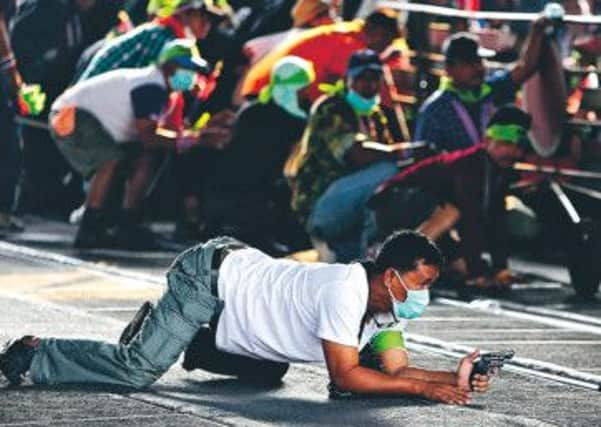Thailand: Ballot box gunfight rocks Bangkok


At least seven people were wounded, including an American photojournalist.
The confrontation began after a group of pro-government supporters marched to a district office in northern Bangkok containing ballot boxes that had been surrounded by protesters who have been trying to derail the vote.
Advertisement
Hide AdAdvertisement
Hide AdThe two sides clashed first with rocks and firecrackers, then with pistols and assault rifles. One group of men carrying sticks smashed the windshields of a car carrying protesters that sped away. People caught up in the mayhem took refuge inside a nearby shopping mall and ducked on a pedestrian bridge.
At least six Thais were wounded, including a reporter for the local Daily News newspaper. The award-winning American photojournalist James Nachtwey was shot in the leg, according to Associated Press staff on the scene.
The violence came a day ahead of a highly unusual ballot that has little to do with traditional contests of rival candidates vying for office.
On the one side are demonstrators who say they want to suspend the country’s fragile democracy to institute anti-corruption reforms.
On the other, are forces supporting the prime minister, Yingluck Shinawatra, who knows the election will do little to solve the nation’s crisis but insists the right to vote should not be taken away.
Protesters say Yingluck is too much under the influence of her brother, the former prime minister Thaksin Shinawatra. Thaksin is in exile after being convicted of corruption by a Thai court. He was removed by the military in 2006.
The protesters – a minority that cannot win power at the polls – are demanding the government be replaced by an unelected council. This would implement political and electoral reforms to combat deep-seated problems of corruption and money politics. Yingluck has refused to step down, arguing she is open to reform and an unelected council would be unconstitutional.
The crisis – which has killed ten people and wounded nearly 600 since November – has overshadowed campaigning. Instead of speeches and electrified rallies for candidates hoping to take office, Thailand’s muted capital has been gripped by a palpable sense of dread and uncertainty over whether demonstrators will physically block voters from getting inside polling centres.
Advertisement
Hide AdAdvertisement
Hide AdThe outcome of today’s election will almost certainly be inconclusive, commentators say. This is because protesters have already blocked candidate registration in some districts, Parliament will not have enough members to convene. That means Yingluck will be unable to form a government or even pass a budget, and Thailand will be stuck in political limbo as by-elections are run in constituencies that were unable to vote.
A power vacuum may entice the military to step in and declare a coup as it did in 2006, when Yingluck’s elder brother Thaksin was deposed.
Desperate to defuse the crisis, Yingluck dissolved the lower house of parliament in December and called new elections. But protests only intensified, and Yingluck – now a caretaker prime minister with limited powers – has found herself increasingly cornered.
Thai courts have begun fast-tracking cases that could see Yingluck or her party banished from power, and the army has left open the possibility of intervening again if the crisis is not resolved peacefully.